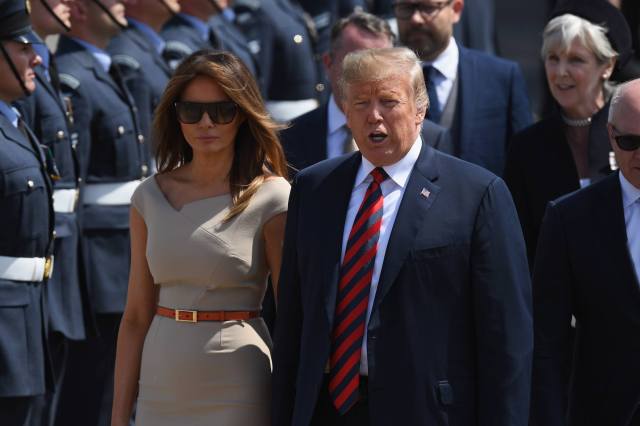President Donald Trump and First Lady Melania Trump arrive at Stansted Airport for their first official visit to Britain. Credit: Leon Neal/Getty Images

Today’s visit to the UK by President Trump is making waves. Well, it’s making waves in Britain, the American press are uninterested, focusing instead on the NATO summit. But with protests planned and serious security scheduled, some in Britain are worrying about making a bad impression. They needn’t be. Why? Because, for better or for worse, “he’s just not that into you”.
It’s not that the Special Relationship is off. It’s more that the UK–US relationship just isn’t that important in Trump’s plans.
Trump’s foreign policy is built on the idea that America needs to be stronger in asserting its narrower self-interests. That means under his guidance, America will seek to renegotiate the terms of the rules-based international order that was built, largely upon America’s insistence, over the last few decades.
And Britain doesn’t feature much into that strategy, for reasons both good and bad. On the plus side, Trump doesn’t think that Britain is a major problem within the current system. Unlike his long-time bete noire Germany, Britain neither runs a large trade deficit nor chronically underfunds its military. Britain is also not a frontline state in the conflict with Russia: Germany and the East would be under any threat long before Britain would. Thus, the argument that Trump advances – that the US is picking up the bill for defending countries against Russia – doesn’t apply to the UK.
In addition, aside from the vital intelligence Britain shares with US spy agencies, the UK simply isn’t a player in arenas that Trump sees as threats – like China and Iran.
The flip side of this is that there’s also nothing Britain has that is of much value to Trump. Unlike other US Presidents, who looked at the UK as a potential military partner, Trump both doesn’t want to use American military might, and when he’s pushed to, he’s a unilateralist of the highest order.
But while Trump is not looking to cement the US-UK relationship for any practical gains, he will value the visit’s symbolism – he has a huge crush on royalty. Meeting the Queen and being feted at Windsor Castle will impress him greatly. Britain should expose Trump to as much pomp and circumstance as is humanly possible. Doing so validates his sense of self-importance – it’s a canny play to his ego.
Which is helpful as Trump would love to sign a trade deal with a Britain free of EU entanglements. He has always said he is not a protectionist, and a trade deal with an established first world economy would demonstrate – to his eyes, at least – that he is true to his word. That ego-massaging might help the Prime Minister manoeuvre the President into expressing this desire forthrightly, ideally at their joint press conference. That would let EU Brexit negotiators know that she has alternatives should they act intransigently.
Trump’s visit has many idiosyncratic elements, but British leaders should note that America’s gaze is very likely to continue to drift away in the coming years. America built the rules-based order to serve its interests at that time. Europe was of primary concern in those early years because its primary foe was the Soviet Union.
America’s primary global rival today is China, and that means it will pay more attention to the Pacific and less to the Atlantic. American presidents have always put “America First” even if they have been less maladroit than Trump about expressing it. Britain’s leaders should recognise and accept that inevitability, and rely less on the special relationship and more on its own virtues to project its values and power in the world.










Join the discussion
Join like minded readers that support our journalism by becoming a paid subscriber
To join the discussion in the comments, become a paid subscriber.
Join like minded readers that support our journalism, read unlimited articles and enjoy other subscriber-only benefits.
Subscribe